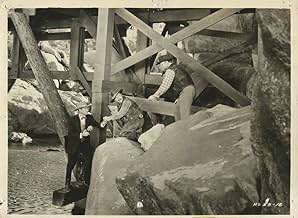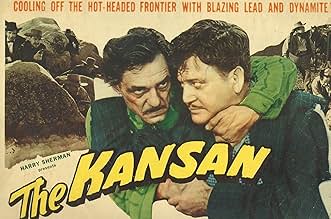A cowboy injured fighting bank robbers awakens to find he's the new marshal. He faces off against the corrupt town banker who's exploiting the locals.A cowboy injured fighting bank robbers awakens to find he's the new marshal. He faces off against the corrupt town banker who's exploiting the locals.A cowboy injured fighting bank robbers awakens to find he's the new marshal. He faces off against the corrupt town banker who's exploiting the locals.
- Nominated for 1 Oscar
- 1 nomination total
Ray Bennett
- Messenger
- (as Raphael Bennett)
Gertrude Astor
- Blonde Townswoman
- (uncredited)
Walter Baldwin
- Judge Lorrimer
- (uncredited)
Ted Billings
- Barfly
- (uncredited)
- Director
- Writers
- All cast & crew
- Production, box office & more at IMDbPro
Featured reviews
This probably doesn't deserve the "B Movie" sobriquet. The production values are pretty high and it is quite heavy on the movie stars. This looks to me like it would have taken the A spot on a bill. Dix is good but Victor Jory nearly steals the show. The high point is likely one of the most over-the-top barroom brawls I've ever seen on celluloid. The script is also fine, although nothing too original. The low point in the movie....aside from a really unfortunate racial caricature.... is probably represented by a really ghastly World War II style showgirl routine based around "When Johnny Comes Marching Home". All in all, a satisfying show.
This is a decent and generally unremarkable western. But, because it stars Richard Dix, it comes off a bit better. While not a household name, Dix was a very fine actor--mostly because he played a great 'everyman'--a believable and rugged guy who was no pretty-boy. Solid, dependable and making the most of his material, he pretty much makes this film worth watching.
The film begins well, as it's pretty creative. Dix is a stranger in a new town and soon after arriving, there's a bank robbery. He happens to be in the right place at the time and is able to thwart the robbers. He gets them but is injured in the process. Here's the twist--when he awakens, he hears the crowd outside his window celebrating the election of a new sheriff...and that sheriff turns out to be HIM! Too good to be true? Yep. That's because a powerful rich guy has his own reasons for having the stranger become sheriff. Fortunately, Dix's character is on dummy. What's next? See this one yourself.
Overall, not a bad little film. Despite a VERY familiar plot, Dix and some decent baddies (Victor Jory and Albert Dekker) are able to elevate this one to more than just another time-passer.
The film begins well, as it's pretty creative. Dix is a stranger in a new town and soon after arriving, there's a bank robbery. He happens to be in the right place at the time and is able to thwart the robbers. He gets them but is injured in the process. Here's the twist--when he awakens, he hears the crowd outside his window celebrating the election of a new sheriff...and that sheriff turns out to be HIM! Too good to be true? Yep. That's because a powerful rich guy has his own reasons for having the stranger become sheriff. Fortunately, Dix's character is on dummy. What's next? See this one yourself.
Overall, not a bad little film. Despite a VERY familiar plot, Dix and some decent baddies (Victor Jory and Albert Dekker) are able to elevate this one to more than just another time-passer.
In Broken Lance, Kansas, John Bonniwell averts the Jesse James gang from holding up the town bank, but is severely wounded in the process. When he awakes in the hospital, he finds that he has been elected town marshall, with high recommendations from the bank owner and leading citizen, Steve Barat. Bonniwell accepts the job (especially after getting an eyeful of the hotel owner Eleanor Sager) even though he knows that he was only appointed to become a pawn in Barat's scheme to bleed Broken Lance, and the Kansas, dry. Bonniwell's position is put to the test when Barat sues Bonniwell's friend Waggoner for running his cattle without paying the $1 a head toll enforced by Barat. When he sees that Bonniwell isn't going to be controlled so easily, Barat has Bonniwell's enemies go after him followed by an attempt by Barat's gambling brother, Jeff (who seems to be playing both sides of the standoff, while in love with Eleanor). Bonniwell then starts to rid Broken Lance of Barat's influence without losing his life, or anyone else's, in the process. Very good western with an excellent script, direction, characterization, and performances by everyone. Dix is right at home as Bonniwell, even though he seems awkward at times. Jory gives one of his best performances as Jeff, and his characterization is very surprising and different from others in the genre. The movie also contains one of the biggest barroom free for alls in any western, with everyone getting into the fracas. Only flaw was the climax was not as action packed as other sequences in the movie, but still a winner all the way. Rating, based on B westerns (this may count as a B+ however), 9.
Richard Dix finds himself elected sheriff of a small town run by land baron Albert Dekker after helping foil a robbery in this B-Western from the '40s. Dekker's the one who had him elected in the expectation that he would become just another of his puppets - but this is Dickie Dix we're talking about, and he's not about to be any man's doormat, even if he does look a little careworn at this stage of his career (death from heart attack was only 6 years away). The widely under-praised Victor Jory plays Dekker's brother, a gambler whose uncertain allegiance to either side makes him by far the film's most interesting character.
Any film with Richard Dix is worth a chance not only because he's a likable and powerful figure but he seemed to bounce around the edges of the studio system so that his films vary standard formulas in unpredictable ways. The Kansan's saloon sets are excellent, for instance, and the crowds well directed--other posts mention the remarkably modern dance number (with perspectival backdrops) and the extended brawl with well-choreographed sequences and character highlights. Outdoor cinematography at the toll-bridge across which several incidents of the plot transpire featured impressive depth and angle.
A big stable of acting talent also raises this film's quality, but I'll let other posters provide those kudos.
My only difference with other posters is their near-blanket condemnation of the Bones character played by the terrific William Best. Certainly most of the film's racial dynamics are regrettably stereotypical, but Dix and Best interact as two smart guys recognizing each other. The film's single best moment for me was when the Jory character enters Best's servant quarters at the Sager Hotel. When Jory walks in, the Bones character is READING, which suggests that not just Willie Best but his character knows that Bones's minstrel persona is an act. Further, when Jory leaves the room, the door swings shut to reveal a portrait of Lincoln.
A big stable of acting talent also raises this film's quality, but I'll let other posters provide those kudos.
My only difference with other posters is their near-blanket condemnation of the Bones character played by the terrific William Best. Certainly most of the film's racial dynamics are regrettably stereotypical, but Dix and Best interact as two smart guys recognizing each other. The film's single best moment for me was when the Jory character enters Best's servant quarters at the Sager Hotel. When Jory walks in, the Bones character is READING, which suggests that not just Willie Best but his character knows that Bones's minstrel persona is an act. Further, when Jory leaves the room, the door swings shut to reveal a portrait of Lincoln.
Did you know
- TriviaFilm debut of Lorraine Clark.
- Quotes
Josh Hudkins: [to Bonniwell] Marshal, I'm the mayor here. Aren't you overstepping your authority?
- ConnectionsFeatured in Doctor Who: The Tenth Planet: Episode 2 (1966)
Details
- Runtime
- 1h 19m(79 min)
- Color
- Aspect ratio
- 1.37 : 1
Contribute to this page
Suggest an edit or add missing content








































